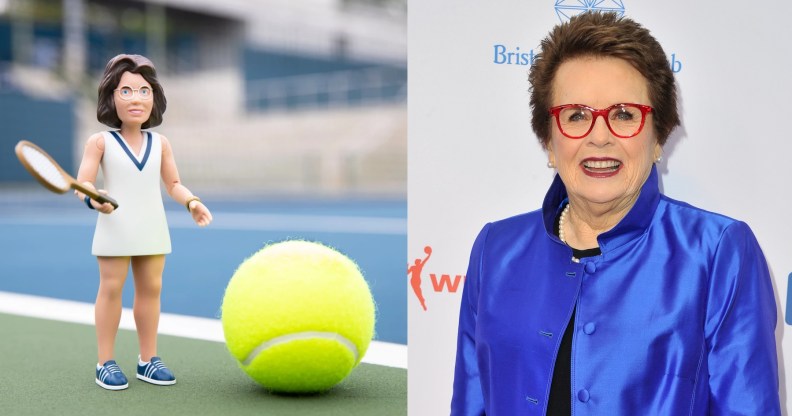Lesbian tennis icon Billie Jean King is now an action figure

Billie Jean King has been turned into an action figure
Lesbian tennis icon Billie Jean King has been turned into a real-life action figure.
The six-inch figure comes with a tennis racket and adjustable limbs, to help smash both injustice and return serves.
The $20 action figure was created by FCTRY as part of a “real life action figures” range, which is dedicated to famous forces for change.
Lesbian tennis icon Billie Jean King immortalised as ‘changemaker’
The company explained: “Billie Jean King is the definition of a changemaker. We’re not sure what’s more impressive: her 39 Grand Slam titles or the impact she’s had on gender equality.
“As one of the greatest tennis players the world has ever seen, BJK defeated Bobby Riggs in the most-watched tennis match in history, founded the Women’s Tennis Association, and even has a stadium complex with her name on it.

The Billie Jean King action figure is part of a range of changemakers
“She was never satisfied with just being an incredible athlete. Throughout her life, Billie Jean King’s mission has always been the same: to fight injustice and use her voice for good.
“She’s been an inspiration for generations and her never-quit attitude has changed the way women are treated in sports and at work.
“That’s why we’ve turned her into an action figure.”
5 per cent of the sales proceeds go to the Billie Jean King Leadership Initiative, which was set up by King and her partner Ilana Kloss to promote female leaders.

Barack Obama, Elizabeth Warren, Ruth Bader Ginsburg, Hillary Clinton and Bernie Sanders action figures
The action figure will have plenty of friends, joining a line-up that includes Barack Obama, Senator Elizabeth Warren, Senator Kamala Harris and US Supreme Court Justice Ruth Bader Ginsburg.
Billie Jean King is an LGBT+ trailblazer
Billie Jean King first spoke about her sexuality back in 1981.
The athlete broke down barriers when she acknowledged her relationships with women for the first time – and the former tennis world number one picked up 39 Grand Slam titles across her career.
She has remained vocal about LGBT+ rights, calling for Australia’s Margaret Court Arena to be renamed in 2018 after Court made anti-gay comments.
She said: “If I were playing today, I would not play on it. I personally don’t think she should have her name anymore.
“I think it’s really important if you’re going to have your name on anything that you’re hospitable, you’re inclusive, you’re open arms to everyone that comes. It’s a public facility.”
“I know it’s not as easy as people think, but I personally don’t think she should have her name anymore.
“I think if you were talking about indigenous people, Jews or any other people, I can’t imagine the public would want somebody to have their name on something. Maybe because of our community, the LGBTIQ community, people might feel differently.
“But we’re all God’s children. We are all God’s children, so I probably don’t think it’s appropriate to have her name.”

